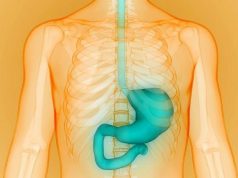Protection against aspirin-associated peptic ulcer bleeding in older adults lost after the first 2.5 years
MONDAY, Nov. 14, 2022 (HealthDay News) — Eradication of Helicobacter pylori reduces the incidence of peptic ulcer bleeding in older adults receiving daily aspirin, but the advantage does not persist after the first 2.5 years of follow-up, according to a study published online Nov. 5 in The Lancet.
Chris Hawkey, from the University of Nottingham in the United Kingdom, and colleagues conducted a randomized trial at 1,208 primary care centers in the United Kingdom. Eligible patients aged 60 years or older who were receiving aspirin at a daily dose of 325 mg or less with a positive breath test for H. pylori at screening were randomly assigned to receive a combination of oral clarithromycin, metronidazole, and lansoprazole (active eradication) or placebo twice daily for one week (2,677 and 2,675 participants, respectively).
In the first 2.5 years of follow-up, the researchers observed a significant reduction in incidence of the primary outcome (time to hospitalization or death due to definite or probable peptic ulcer bleeding) in the active eradication group versus control group (rate, 0.92 versus 2.61 per 1,000 person-years; hazard ratio, 0.35; 95 percent confidence interval, 0.14 to 0.89; P = 0.028). After adjustment for the competing risk for death, the advantage remained significant, but with longer follow-up, the advantage was lost (hazard ratio, 1.31; 95 percent confidence interval, 0.55 to 3.11; P = 0.54 after the first 2.5 years).
“The loss of ulcer protection with time appears to be a real phenomenon that cannot be attributed to increasing use of gastroprotective drugs, which would have an opposite effect,” the authors write.
Editorial (subscription or payment may be required)
Copyright © 2022 HealthDay. All rights reserved.








